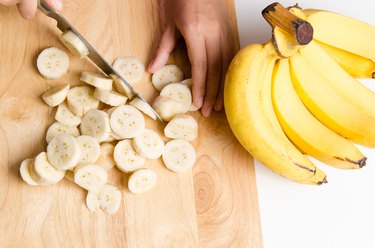
Along with sodium and calcium, the role of potassium in muscle contraction is an important one. Considered to be one of the many important minerals required by the body in order to function properly, potassium is also classified as an electrolyte because it carries an electrical charge.
The National Institutes of Health's Office of Dietary Supplements states that in addition to its positive relationship to muscle contraction, potassium is necessary for the transmission of nervous impulses and regular kidney functioning. Increasing the potassium in your diet can also lower the risk of cardiovascular disease and hypertension, per the Centers for Disease Control and Prevention.
Video of the Day
Video of the Day
Tip
Adequate potassium and muscle function go hand-in-hand. That's because potassium is necessary for the contraction of not just cardiac muscles but smooth and skeletal muscles as well.
Muscle Contraction Mechanism
The human body contains three main types of muscle groups: smooth muscles, skeletal muscles and cardiac muscles. And according to MedlinePlus, potassium is critical in muscle contraction for all the three key muscle groups. It's known that potassium and muscle function are inextricably linked.
Read more: Symptoms of a Potassium Overdose
Potassium ions are present inside cells in larger amounts than they are outside of cells. The opposite is true for sodium, which is present in higher amounts outside of the cell. As a result, this difference in concentration level between the two electrolytes causes what is known as "membrane potential," which needs to be constantly maintained so muscle contraction can occur in any of the three key types of muscle.
Reduced levels of potassium — along with other electrolytes like magnesium and calcium — is one of several reasons why a person's muscles may begin to cramp, experiencing what is sometimes colloquially referred to as a charley horse.
Potassium and Muscle Function
The findings of a small study of 10 men published in March 2019 in BMJ Open Sport & Exercise Medicine indicate that drinking water rich in electrolytes may decrease the occurrence of muscle cramping that happens after a rigorous bout of exercise. Although the role of sodium in muscle contraction is key to preventing cramping, potassium is equally important. It is an essential electrolyte that the body requires to help reduce the chances of cramping in fatigued muscles.
A study published in the February 2015 issue of Cold Spring Harbor Perspectives in Biology explains that when it comes to heart muscles, the role of sodium in muscle contraction is equally as important as the roles of calcium and potassium in muscle contraction as well. Low levels of potassium can cause irregular heart rhythms, which, according to Oregon State University's Linus Pauling Institute, if left untreated, can ultimately lead to death.
In addition to the role of potassium in muscle contraction, the mineral is also required by certain enzymes in the body in order for them to properly function. For example, the process of metabolizing carbohydrates — which needs an enzyme called pyruvate kinase — cannot take place without the presence of potassium.
Incorporate Sources of Potassium
According to the Dietary Supplement Label Database, the recommended daily dose of potassium for adults is 4,700 milligrams. This can be easily achieved by consuming meat like steak, pork and chicken, as well as seafood like salmon, cod and sardines.
Read more: What Causes Muscular Fatigue?
Fruits and vegetables are also good sources of potassium, with high amounts found in broccoli — a 100 gram serving of raw broccoli has approximately 316 milligrams of potassium — along with potatoes, tomatoes, bananas, kiwis and apricots. Dairy products all contain high amounts of potassium, with an 8-ounce serving of whole milk yogurt offering 352 milligrams of potassium.
For nuts, the highest amount of potassium is found in coconut water, the liquid present inside fresh, whole coconuts. A cup of coconut water offers 600mg of potassium, which is equivalent to 13% of daily value. The USDA explains that while fruits and vegetables provide a better source of potassium, nuts and seeds like hemp seeds and pistachios also serve as acceptable alternatives when needed.
- Office of Dietary Supplements: "Potassium Fact Sheet for Consumers"
- Center for Disease Control and Prevention: "The Role of Potassium and Sodium in Your Diet"
- MedlinePlus: "Muscle Cramps"
- BMJ Open Sport & Exercise Medicine: "Water Intake After Dehydration Makes Muscles More Susceptible to Cramp but Electrolytes Reverse That Effect"
- USDA FoodData Central: "Broccoli, Raw"
- USDA FoodData Central: "Yogurt, Plain, Whole Milk"
- MyFoodData.com: "15 Nuts and Seeds High in Potassium"
- Oregon State University: Linus Pauling Institute: "Potassium"
- Dietary Supplement Label Database: "Labeling Daily Values"
- Cold Spring Harbor Perspectives in Biology: "Signaling in Muscle Contraction"
- MedlinePlus: "Potassium in Diet"